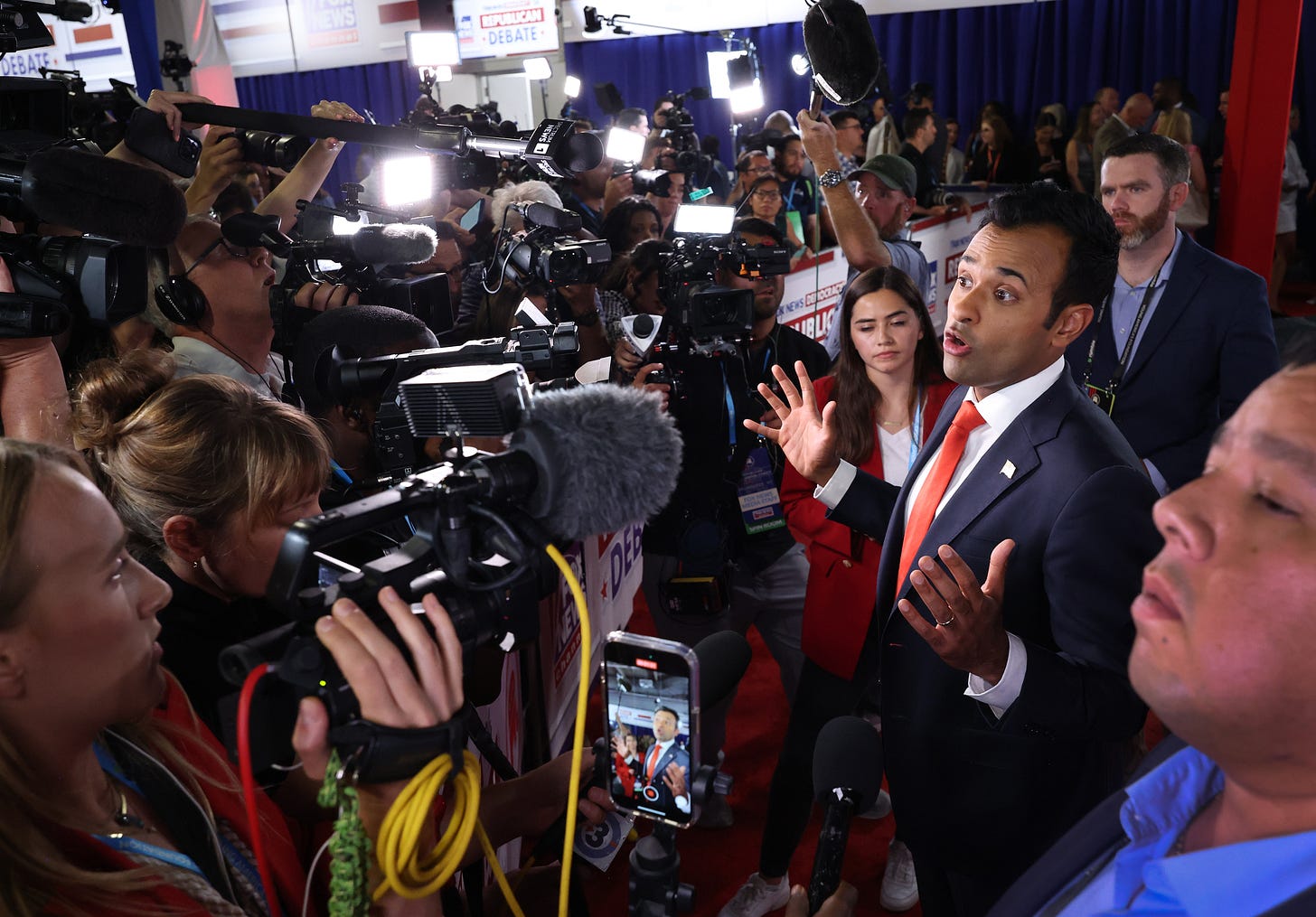Big Issues. Little Candidates.
In the Republican debate, disappointingly unserious responses to serious questions about Ukraine and climate change.

THE MODERATORS ASKED some serious questions about foreign policy, but with few exceptions, the candidates at Wednesday night’s Republican debate in Milwaukee were at best unserious about two of the world’s biggest challenges: climate change and the war in Ukraine.
In response to a question from a young voter asking if the candidates care about climate change, Ron DeSantis attacked the moderator for posing it as a raise-your-hands yes/no, then went into an apparently prepared attack on President Joe Biden’s response to the Maui fires. Then Vivek Ramaswamy called climate change a “hoax,” appealed to conspiracy theorists by claiming he was the only candidate onstage willing to tell the truth, and said “the anti-carbon agenda” is a “wet blanket on our economy.” Nikki Haley and Tim Scott, ostensibly among the serious candidates in the race, both went with economic nationalism, trying to attack China and Biden together, arguing against green energy without proposing alternatives.
Not one candidate tried to reassure young Americans (let alone other Americans or the rest of the world) that they take climate change seriously, even if they disagree with Democrats’ approach to countering it.
When the topic turned to Ukraine, DeSantis gave a weak, weaselly answer about telling Europe to “pull their weight,” saying “our support should be contingent” on their doing so. He appeared to be trying to oppose aid without directly opposing Ukraine while still seeming tough, and failed in multiple ways.
Eleven European countries (including Poland, Norway, Estonia, and the United Kingdom) have given a higher percentage of their GDP to Ukraine than the United States, and have given more advanced weapons. By recycling an out-of-date complaint about NATO and otherwise ducking the question, DeSantis failed to look like a commander-in-chief to anti-Russia parts of the party, while probably also failing to please primary voters who oppose U.S. support for Ukraine.
Ramaswamy got one of the night’s biggest cheers by opposing aid outright, and declaring that “we should use those same military resources to prevent . . . the invasion of our own southern border.” That’s a false choice: America can easily spend more on the border and send older equipment worth a fraction of one year’s U.S. military budget to Ukraine. Cutting one wouldn’t increase funding to the other. It’s ridiculous (and pretty racist) to equate migrants seeking a better life with foreign military assaults that kill thousands. Moreover, things like rocket artillery systems and demining vehicles wouldn’t help border security.
Other candidates took a line more in keeping with traditional—that is, pre-Trump—GOP policy stances. Chris Christie defended his recent trip to Kyiv to a couple of claps, detailed Russian horrors, and denounced both Vladimir Putin and Donald Trump’s praise of Putin, getting boos. Mike Pence and Nikki Haley both made Reaganite cases for supporting Ukraine, and criticized Ramaswamy for proposing appeasement, getting applause. At least parts of the crowd seemed into the idea of the leader of the free world helping a European democracy against Russian aggression.
But heading into the debate, Pence, Haley, and Christie had a combined 10.2 percent support in the RealClearPolitics national polling average. DeSantis and Ramaswamy combined for 21.5. And Trump dominates them all with 55.4 percent nationally, along with leads of over 25 points in both Iowa and New Hampshire. Unless that changes dramatically—and there is little reason to think it will—the 2024 campaign will likely consolidate the Republican party around the position that the United States should be pushing Ukraine to give Putin what he wants, or at least leave the Ukrainians weaker so that they’re more likely to.
And that gives Russia an incentive to keep the war going, even at considerable cost.



